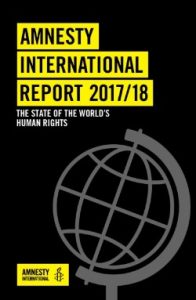 Amnesty International have released their report for 2017/18, The state of the world’s human rights,which documents the state of the world’s human rights in 159 countries and territories during 2017. It speaks of conflict, austerity measures, discrimination and natural disasters across the globe and reports that “governments of all persuasions continued to crack down on the rights to freedom of expression, association and assembly”.
Amnesty International have released their report for 2017/18, The state of the world’s human rights,which documents the state of the world’s human rights in 159 countries and territories during 2017. It speaks of conflict, austerity measures, discrimination and natural disasters across the globe and reports that “governments of all persuasions continued to crack down on the rights to freedom of expression, association and assembly”.
With regard to Tibet, the report said, “Ethnic Tibetans continued to face discrimination and restrictions on their rights to freedom of religion and belief, of opinion and expression, of peaceful assembly and of association”. It mentions that “At least six people set themselves on fire in Tibetan-populated areas during the year in protest against repressive policies”.
They quote the UN Special Rapporteur on extreme poverty and human rights who has stated that the situation of Tibetans and Uighurs was “deeply Problematic”, and “that most ethnic minorities in China are exposed to serious human rights challenges, including significantly higher poverty rates, ethnic discrimination and forced relocation.”
Under the section on China, the report speaks of new laws which present serious threats to human rights under the guise of “national security”. It mentions the Chinese Nobel Peace Prize laureate Liu Xiaobo who died in custodyandTashi Wangchuk, a Tibetan education Advocate who remains in detention, as well as activists and human rights defenders who were detained, prosecuted and sentenced on charges such as“subverting state power” and “picking quarrels and provoking trouble”.
An increase in repression of religious activities outside state-sanctioned Churches is mentioned, and the “anti-separatism” or “counterterrorism” campaigns which, it says, remain particularly severe in Tibetan-populated areas, and in the Xinjiang Uighur Autonomous Region in northwestern China.
The report says the new National Intelligence Law presents“serious threats to the protection of human rights [and][…] granted effectively unchecked powers to national intelligence institutions with unclear roles and responsibilities”, and spoke of the lack of “safeguards to protect against arbitrary detention and to protect the right to privacy, freedom of expression and other human rights”.
The report states that the revised Regulations on Religious Affairs, “codified farreaching state control over every aspect of religious practice, and extended power to authorities at all levels of the government to monitor, control and potentially punish religious practice. The revised law […] could be used to further suppress the right to freedom of religion and belief, especially for Tibetan Buddhists, Uighur Muslims and unrecognised churches.”
Amnesty International is an independent global movement of more than seven million people who “campaign for a world where human rights are enjoyed by all”.




 Print
Print Email
Email